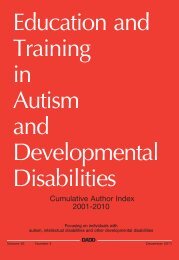etadd_47(3) - Division on Autism and Developmental Disabilities
etadd_47(3) - Division on Autism and Developmental Disabilities
etadd_47(3) - Division on Autism and Developmental Disabilities
Create successful ePaper yourself
Turn your PDF publications into a flip-book with our unique Google optimized e-Paper software.
Educati<strong>on</strong> <strong>and</strong> Training in <strong>Autism</strong> <strong>and</strong> <strong>Developmental</strong> <strong>Disabilities</strong>, 2012, <str<strong>on</strong>g>47</str<strong>on</strong>g>(3), 345–358<br />
© <str<strong>on</strong>g>Divisi<strong>on</strong></str<strong>on</strong>g> <strong>on</strong> <strong>Autism</strong> <strong>and</strong> <strong>Developmental</strong> <strong>Disabilities</strong><br />
Cognitive Strategy Instructi<strong>on</strong> for Functi<strong>on</strong>al Mathematical<br />
Skill: Effects for Young Adults with Intellectual Disability<br />
Youjia Hua, Benjamin S. T. Morgan, Erica R. Kaldenberg, <strong>and</strong> Minkowan Goo<br />
The University of Iowa<br />
Abstract: This study assessed the effectiveness of a three-step cognitive strategy (TIP) for calculating tip <strong>and</strong><br />
total bill for young adults with intellectual disability. In the c<strong>on</strong>text of pre- <strong>and</strong> posttest n<strong>on</strong>equivalent-groups<br />
design, 10 students from a postsec<strong>on</strong>dary educati<strong>on</strong> program for individuals with disabilities participated in the<br />
study. A teacher delivered six less<strong>on</strong>s to students in the experimental group using the working instructi<strong>on</strong>al<br />
model for teaching learning strategies. Results indicate that the experimental group outperformed the comparis<strong>on</strong><br />
group <strong>on</strong> items that assessed the ability to calculate tip <strong>and</strong> total bill. Students from the experimental<br />
group also generalized the procedural knowledge to tasks that required using percent values in different c<strong>on</strong>texts.<br />
Four of the students from the experimental group maintained the use of the strategy 8 weeks after the<br />
interventi<strong>on</strong>.<br />
Self-determinati<strong>on</strong>, the ability to c<strong>on</strong>trol <strong>on</strong>e’s<br />
own life without relying <strong>on</strong> caregivers, is an<br />
important educati<strong>on</strong>al outcome for individuals<br />
with disabilities as they transiti<strong>on</strong> to adult<br />
living (Field & Hoffman, 2002; Wehmeyer,<br />
Agran, & Hughes, 1998). Self-determinati<strong>on</strong> is<br />
often associated with the success achieved in<br />
the areas of living, employment, <strong>and</strong> educati<strong>on</strong><br />
(Halpern, 1993). One set of skills that is<br />
necessary to fulfill the expectati<strong>on</strong> of independent<br />
functi<strong>on</strong>ing in these areas is financial<br />
aut<strong>on</strong>omy including the ability to earn, budget,<br />
<strong>and</strong> spend m<strong>on</strong>ey (Browder & Grasso,<br />
1999). Unfortunately, individuals with disabilities<br />
often have difficulties with m<strong>on</strong>ey management<br />
skills (Yan, Grasso, Dipipi-Hoy, & Jitendra,<br />
2005). These difficulties, in turn,<br />
affect all aspects of adult life. For example, the<br />
Nati<strong>on</strong>al L<strong>on</strong>gitudinal Transiti<strong>on</strong> Study (Wagner<br />
et al., 1991) examined the financial management<br />
activities performed by young adults<br />
with learning disabilities who had been out of<br />
the schools for up to two years <strong>and</strong> found that<br />
very few participants had checking accounts<br />
(8.1%), a credit card of their own (8.1%), or<br />
Corresp<strong>on</strong>dence c<strong>on</strong>cerning this article should<br />
be addressed to Youjia Hua, Department of Teaching<br />
<strong>and</strong> Learning, N256 Lindquist Center, The University<br />
of Iowa, Iowa City, IA 52242. Email: youjiahua@uiowa.edu<br />
other investments (0.4%). The results of the<br />
study indicate that young adults with learning<br />
disabilities are not engaged in some of the<br />
essential m<strong>on</strong>ey management activities that<br />
most adults will need.<br />
Researchers suggest that <strong>on</strong>e important reas<strong>on</strong><br />
why individuals with disabilities have limited<br />
opportunities to reach financial aut<strong>on</strong>omy<br />
is that they lack essential functi<strong>on</strong>al<br />
mathematical skills (Patt<strong>on</strong>, Cr<strong>on</strong>in, & Bassett,<br />
1998). Mathematical deficiencies are as<br />
comm<strong>on</strong> as difficulties in reading for individuals<br />
with disabilities (Deshler, Ellis, & Lenz,<br />
1996). Researchers found that students with<br />
learning difficulties tend to acquire mathematical<br />
skills at a slower rate <strong>and</strong> have difficulties<br />
with skill retenti<strong>on</strong> <strong>and</strong> generalizati<strong>on</strong><br />
(Miller & Mercer, 1997). Limited mathematic<br />
literacy for students with learning difficulties<br />
appears in elementary school <strong>and</strong> persists<br />
throughout their adulthood (e.g., Kirby &<br />
Becker, 1988). As a result, social <strong>and</strong> ec<strong>on</strong>omic<br />
independence of adults with disabilities<br />
is negatively affected (Lerner, 1993). In<br />
order to prepare these individuals for the dem<strong>and</strong><br />
<strong>and</strong> challenges of adult life, postsec<strong>on</strong>dary<br />
mathematical curriculum should focus <strong>on</strong><br />
the skills that will be used <strong>on</strong> the job, at home,<br />
<strong>and</strong> in the community (Deshler et al., 1996;<br />
Patt<strong>on</strong> et al., 1998).<br />
In additi<strong>on</strong> to a functi<strong>on</strong>al skills oriented<br />
Functi<strong>on</strong>al Mathematical Skill / 345

















